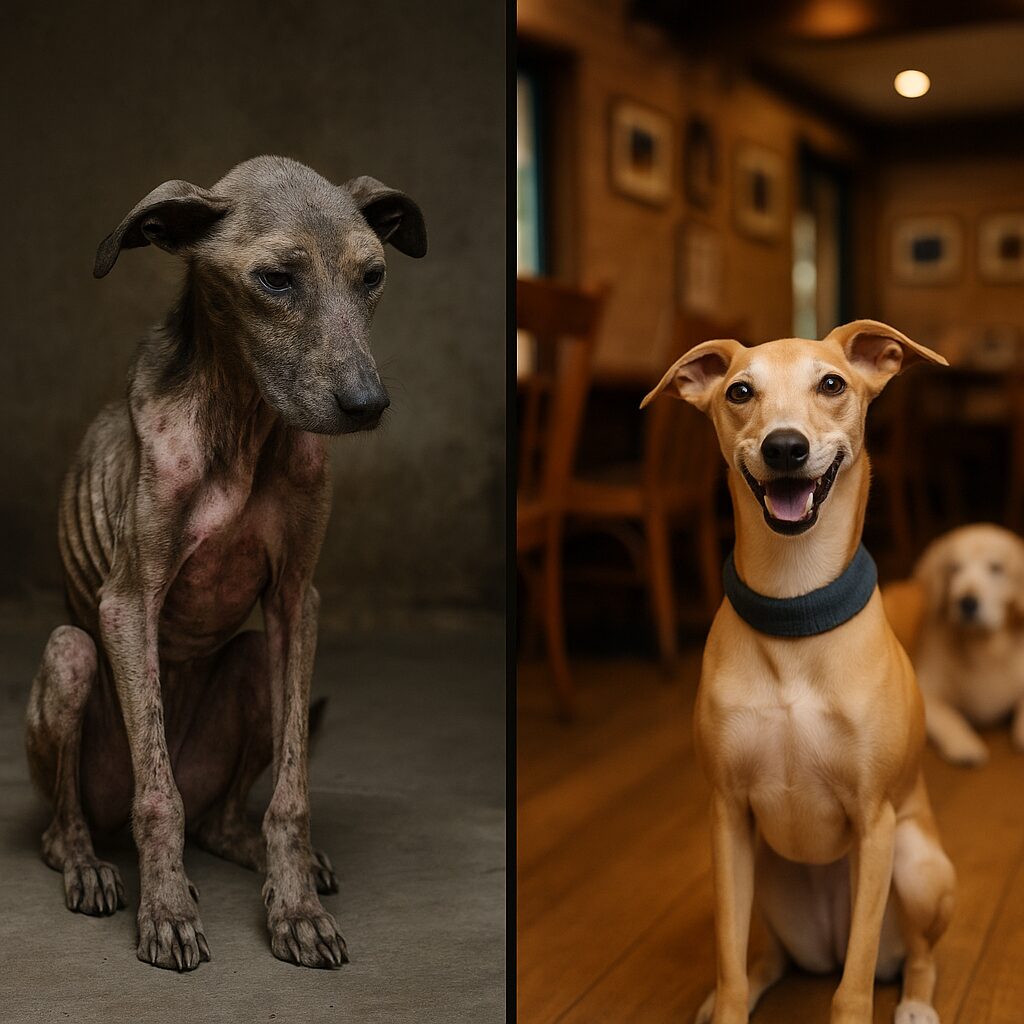When visitors step inside, they’re greeted not by the hiss of espresso machines alone, but by the soft patter of paws across wooden floors. The walls are painted in warm tones, sunlight streams in through the windows, and there’s always a gentle hum of happiness in the air.
The dogs—each one rescued from neglect, abandonment, or difficult pasts—live here temporarily under the loving care of the staff. They’re bathed, fed, and gently socialized so they can regain their confidence. Instead of metal cages or sterile kennels, they roam freely in a cozy café environment designed to feel like a home.
Customers order coffee, take a seat, and soon find a curious nose or a pair of gentle eyes looking up at them. It’s an encounter that often starts with a smile—and sometimes ends with a signature on an adoption form.
The café’s philosophy is simple: connection heals. When people and dogs meet in an environment of warmth and trust, both hearts open.
From Street to Sanctuary
Many of the dogs who come to this café were once victims of Japan’s quiet but persistent problem of pet abandonment. Despite the country’s reputation for tidiness and order, thousands of dogs are still left behind each year—some by owners who underestimate the lifelong responsibility of pet care, others by aging families who can no longer manage.
At Tachikawa’s Rescue Dog Café, every new arrival is given a name, a medical check-up, and something they may not have felt in a long time: safety.
There’s Momo, a timid cream-colored Shiba who trembled at the sound of footsteps when she first arrived. Now she wags her tail whenever she sees a new guest, nudging for head pats. There’s Kenji, a small terrier mix who once scavenged for scraps near a construction site—now he’s known as the café’s “greeting ambassador,” always the first to welcome visitors.
Each dog’s transformation is quiet but powerful. It’s in the way their eyes soften over time, the way they finally nap with their bellies up, or the way they start to play again after weeks of silence.
The Power of Gentle Encounters
Unlike traditional shelters, this café doesn’t rely on pity to inspire adoption. Instead, it focuses on experience. Visitors come in not to “shop” for a dog, but to simply share space, enjoy a drink, and let bonds form naturally.
Some people come out of curiosity. Others arrive after losing a beloved pet, not yet ready to adopt but longing for a familiar warmth. There are children who giggle shyly as a dog rests its head on their lap, and elderly visitors who find comfort in quiet companionship.
Every interaction matters. It helps the dogs remember that people can be kind, that hands can comfort rather than harm. And it helps visitors remember that love, in its purest form, asks for nothing in return.
More Than a Café—A Movement
The Rescue Dog Café is part of a growing trend in Japan that blends animal welfare with lifestyle experiences. Similar spaces have popped up in cities like Osaka, Kyoto, and Fukuoka, but the Tachikawa branch stands out for its community-driven approach.
Local volunteers regularly drop by to help walk the dogs, clean, or donate supplies. High school students sometimes come for service-learning activities, and nearby businesses hold small charity events to support the café’s work.
On weekends, adoption fairs and educational sessions are held. Staff teach visitors about responsible ownership—how to care for aging dogs, the importance of vaccinations and sterilization, and how to read canine body language. These events help bridge a crucial gap in awareness: that pet ownership is not a hobby, but a lifelong commitment.
In Japan, where apartments are small and work hours are long, many people hesitate to adopt. The café model offers an alternative—a slower, more intentional path to adoption. By allowing potential owners to interact naturally with dogs over time, it increases successful, lasting matches.
A Culture Slowly Changing
For decades, Japan’s approach to stray animals leaned heavily on control rather than compassion. Until the early 2000s, public animal control centers often had to euthanize thousands of dogs and cats annually due to overpopulation. But thanks to the rise of NGOs, awareness campaigns, and community support, the country’s numbers have improved dramatically.
Tokyo’s 23 wards now boast some of the lowest euthanasia rates in the nation, with many shelters achieving near-zero kill status. Much of that progress comes from initiatives like the Rescue Dog Café, which reimagines animal welfare not as charity, but as culture—a daily habit of empathy woven into urban life.
The Tachikawa café, for example, partners with local rescue organizations to receive dogs who are ready for rehoming. Each successful adoption is celebrated with a handwritten note on the café’s “Wall of Hope.” Visitors can read the messages—some simple, some tearful—left by new families.
“We came here just to have coffee. We left with a friend.”
“Our dog used to hide in corners, but now she sleeps on our bed.”
“Thank you for bringing light back into his eyes.”
Each note is proof that compassion spreads quietly, one household at a time.
Healing Works Both Ways
What many visitors don’t expect is that the healing goes both directions.
The dogs, of course, gain new homes, warmth, and safety. But for the people who meet them, the impact can be just as deep.
Take Yuko, a 38-year-old nurse from Hachioji, who first visited after a difficult breakup. “I just wanted a quiet place,” she recalls. “Then this little brown dog came up and leaned on my leg. He didn’t ask for anything—he just stayed. I started crying.”
Yuko eventually adopted that same dog, now named Choco. “He saved me more than I saved him,” she says.
Stories like hers are common. Dogs, with their pure presence and acceptance, remind us how to feel again. They don’t care about our mistakes or social masks—they simply want connection.
The café’s founder once said, “We don’t rescue dogs. They rescue us back, every single day.”
The Everyday Magic
Spend a few hours at the café and you’ll notice little miracles happening all the time.
A child who was afraid of dogs giggles as one rolls onto its back for belly rubs.
A quiet man working remotely from his laptop pauses when a dog rests its head on his knee.
A couple argues softly, then smiles when a golden retriever interrupts them by nudging for attention.
It’s these gentle, unscripted moments that give the café its charm. They aren’t grand rescues or dramatic transformations—they’re quiet reminders that empathy is contagious.
Even those who don’t adopt still leave changed. Some donate money. Others share the café on social media, inspiring more visitors. Some return again and again, forming bonds with the dogs like old friends.
Love, Served Daily
The staff at the Rescue Dog Café work long hours. Their day begins before sunrise—feeding, grooming, cleaning, checking on the health of each dog. Between customers, they answer adoption inquiries, coordinate with shelters, and manage paperwork. Yet despite the workload, their smiles never fade.
For them, every successful adoption is worth the exhaustion.
When a dog finds a home, the moment is bittersweet. The staff gather at the door to wave goodbye, tears often in their eyes. But their sadness is mixed with joy, because they know what that goodbye means: a new beginning.
After the adopter leaves, the café often posts a small update online. A photo of the dog, perhaps lying on a new sofa or walking in a park, captioned simply: “Found happiness.”
Those two words say everything.
Why It Matters
In a world that moves too fast, where loneliness is an epidemic and compassion feels like a luxury, places like the Rescue Dog Café remind us what really matters. They show that kindness doesn’t need to be grand or loud—it can be as simple as sitting quietly beside a dog who’s learning to trust again.
Japan’s café culture has always been about connection—people gathering over tea, conversation, and comfort. By bringing rescue dogs into that space, this Tachikawa café has transformed a daily ritual into something profoundly meaningful.
It’s no longer just a stop for caffeine; it’s a sanctuary for healing.
A Final Sip of Hope
Before you leave the café, you’ll notice a message written near the counter:
“Every coffee helps save a life.”
And it’s true. A portion of every sale goes directly to supporting veterinary care, food, and rescue operations. Each visitor—whether they adopt or not—plays a small part in rewriting a dog’s story.
Outside, the streets of Tachikawa bustle with people, trains, and the rhythm of city life. Yet, tucked away on this quiet corner, a handful of dogs rest peacefully, waiting for the next person to walk in and change everything.
Because sometimes, love doesn’t start with a grand plan—it begins with a wagging tail and a cup of coffee.
And in this little café, love is always on the menu. ☕💛🐾

